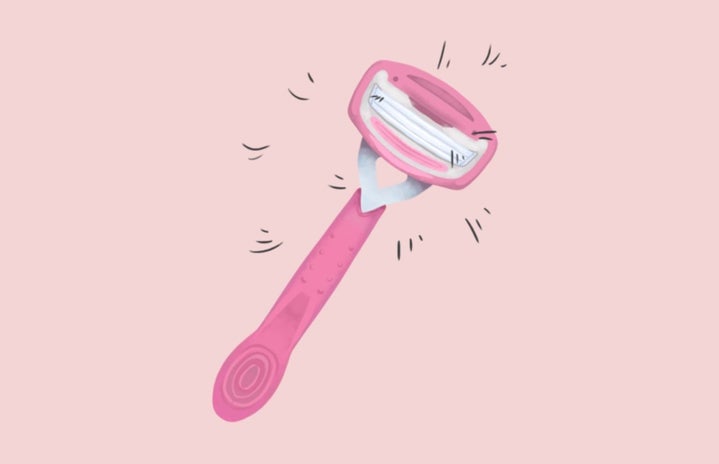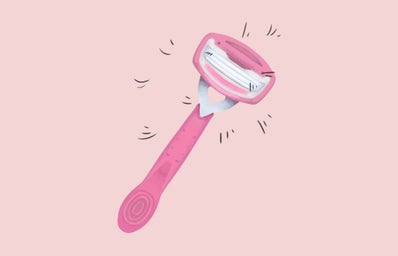On aisle 18 of the CVS in Playa Vista, two identical razors hang side by side: one pink, the other blue. Anastasia Pioro goes to grab the pink razor but stops when she notices that its price is higher than the blue. The culprit: the pink tax.
The Pink Tax is the extra amount women are charged for everyday products and services. On average, women spend about $1,350 a year more than men on similar goods and services, such as deodorant to hair cuts. The tax includes razors, dry cleaning, haircuts, feminine hygiene products, and more.
Tampons and pads are marked with extra sales tax because they are considered “luxury items” as they don’t have the tax exemption status granted to other products considered “medically necessary,” such as ChapStick and dandruff shampoo. The ‘tampon tax’ is a consumption tax, regulated in the form of a sales tax in the United States, or a value added tax (VAT) abroad. Although there is no tax targeted specifically at feminine hygiene products, these products are simply part of the sales tax tax base.
“First of all, we should not even be paying for this at all because it’s not like we asked to have periods,” says Pioro, 22.
“[It’s] just institutionalized mysoningy,” her friend, Madison Vandentillart, added.
Pioro puts back to pink razor, and grabs the blue one to buy.
A 2015 study by the New York City Department of Consumer Affairs found that products marketed for women cost 7 percent more than products marketed for men. The study also revealed that the highest premium for women was for personal care items—shampoo and conditioner, lotion, and razors—which cost on average 13 percent more than men’s.
News outlets and online blogs such as NPR, Buzzfeed, and Hellogiggles coined 2015 to be the “Year of the Period.” Since then, more and more people have begun to raise awareness about this issue and combat it directly through legislative action, and starting companies that sell high-quality, low-cost personal care items.
Although California passed a gender discrimination pricing law on services—haircuts, laundry, and dry cleaning—in 1996, state lawmakers have recently proposed bills that would put an end to the sales tax on feminine hygiene products. In 2016, State Assemblywoman Cristina Garcia of Bell Gardens introduced Assembly Bill 1561, which would end the tax on feminine hygiene products.
“I have always been upset that I get taxed for being born with a uterus and felt that it’s really unfair, so when I got to the legislature I […] decided to use the soap box that I sit on to discuss this,” says Garcia. “The tax codes [are] a reflection of our values, so I wanted spread the message that we should value our biology, that we should value women’s bodies, and that having a period is not a luxury.”
Garcia adds that having your period is “something not to be ashamed of, and so [she] also wanted to use [her] platform to have a discussion about how [we’ve been] taught that it’s taboo, something to be ashamed of, something dirty, when it’s not.”
Although Assembly Bill 1561 was later vetoed by Gov. Jerry Brown, Garcia introduced similar bills two additional times in 2017.
“Assembly Bill 9 was to get rid of the tax on menstrual products, and Assembly Bill 10 was to ensure that we would have menstrual products in bathrooms at learning institutions—whether it’s a K-12, universities, or community colleges,” says Garcia. “The bill negotiation ended up being that we would provide menstrual products in the bathrooms at low income schools, middle schools and high schools across the state.”
Garcia hopes that in the upcoming years, society will “be able to get to the point where our periods are not taboo,” and therefore not see feminine hygiene products as luxury items, but as necessities.
With the recent rise in popularity of online stores, companies such as Billie have attempted to combat the pink tax through their online subscription services by pricing their high-quality personal care products at a more affordable price. Georgina Gooley, co-founder of Billie, says that the company has “made it their mission from the very beginning to put women first with products that are uniquely built for the way women shave and priced fairly, without the ‘Pink Tax.’”
Along with pricing their starter pack at $9—which includes a razor handle, a magnetic holder, and two five-blade razor cartridges—the company also started a Pink Tax Rebate program that encourages women to inform their friends and family of the pink tax while giving them additional discounts when referring the service. With this program, Gooley states that “Billie hopes to ‘reimburse’ women for all the years spent over-paying for women’s razors and will continue to shine light on the price inequality.” For every order after the first, Billie sends four replacement blade cartridges for $9.
Others have also taken to the internet to shine a light on the price inequality women face, such as Michael Cone, a trade lawyer who started the website Pink.tax in 2016. Today Cone’s site receives 6,000-7,000 views per month from all over the world. By sharing recent news articles on the tax, as well as educating people on the basics of the tax, he hopes his readers “one, understand that this phenomenon is real, and two […] understand that there are ways to fix it.”
He agrees that due to new high-quality, low-cost personal care companies emerging, major drugstore companies are “struggling with how to address [the pink tax]. They want to adjust to it, but not lose profits.”
“To maximize profits, firms use a variety of techniques to charge prices close to the highest price different consumers are willing to pay,” states a 2018 report from the U.S. Government Accountability Office (GAO) on gender-related price differences for goods and services. “Firms may attempt to get segments of the consumer market to pay a higher price than another segment by slightly altering or differentiating the product.”
Cone states that in economic theory, when a company divides its market into two, “there are ways to charge higher prices to one versus the other, and then collectively have higher profits in the end.” He explains that companies prey on gender insecurity, making women feel as if they need the pink razor rather than the blue, and then are able to extract extra profits by marking the pink razor at a higher price.
“This is not a Democrat versus Republican issue,” he says. “Nobody should want higher prices on items just because they’re for one gender or another.”
In the coming years, Cone hopes that there will be national legislation put in place that prohibits gender-based pricing in the provision of services, elimination of the sales tax on feminine hygiene products, and that big companies stop preying on their customer’s gender insecurities.
Cone adds that he hopes his readers understand the pink tax is not just a woman’s issue, but a societal issue, and that “it is everybody’s problem to help solve.”



